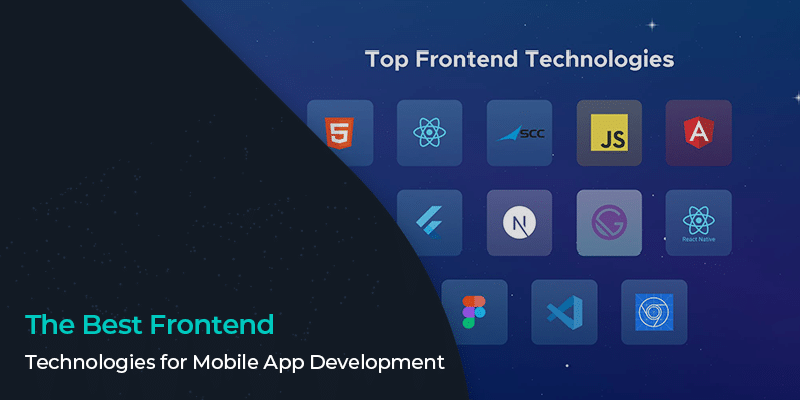Introduction
Mobile apps today serve as the fundamental foundation for our everyday activities since they support digital social networks, retail businesses, and productivity programs. A well-performing frontend technology is essential for delivering engaging and responsive mobile applications to users.
Front-end frameworks together with libraries determine critical aspects of app development including performance quality, scalability, and coding efficiency. Multiple mobile development technologies dominate the industry now because they provide both flexibility and user-friendly interfaces.
List Of 6 Best Frontend Frameworks Used For Mobile App Development
React Native
Facebook created React Native which has become one of the most common tools within this space. A single JavaScript and React-based code base makes it possible for app developers to deliver cross-platform apps.
Key Features:
- Single codebase for cross-platform app development
- Hot reloading feature for quick updates
- Robust and reliable community support
- Smooth integration with native modules
Advantages:
- The shared codebase enables both time and cost savings
- Offers native-like performance to applications
- A wide range of third-party libraries and plugins
Best For:
- The solution works well for businesses requiring economical development approaches.
- The need for fast application development and continuous updates through iterative methods.
- Native user experience stands essential for some premium mobile app agencies and applications.
Flutter
Google introduced Flutter as an open-source UI toolkit that helps UK developers make natively compiled applications that work for mobile platforms as well as web and desktop from the same code base.
Key Features:
- Use of Dart programming language
- A wide range of custom widgets
- Hot reload feature for quick changes
- Skia which is a high-performance engine
Advantages:
- Offers a user interface that is expressive and high-performing
- Fast development process because developers have access to pre-built widgets
- Provides a consistent user experience on different platforms
Best For:
- Mobile applications that need optimized-performance with a complex design.
- Businesses that require beautiful branded mobile apps as part of their development needs.
- Multifunctional developers who work with one technology base for developing various platforms.
SwiftUI
The UI framework SwiftUI exists solely for developing high-performing iOS applications in a modern and advanced way through Apple using a clear syntax that requires minimal code.
Key Features:
- Declarative syntax simplifies UI development
- Seamless integration with existing Swift code
- Real-time UI preview during development
- Automatic support for Dark Mode and Accessibility
Advantages:
- Shorter development cycles because of simplified programming language syntax
- Developed and optimized solely to support the ecosystem of Apple
- Offers a high-performance suitable for various industries
Best For:
- Exclusive iOS applications that support only Apple’s ecosystem.
- Works effectively for apps that require maximum optimization and performance.
- Developers that are proficient with working with iOS devices.
Kotlin Multiplatform Mobile (KMM)
Kotlin Multiplatform Mobile (KMM) represents an upcoming development technology that allows developers to reuse their code between Android and iOS platforms through native UI components.
Key Features:
- The platform enables code sharing that maintains unchanged native user interface elements
- Offers smooth transmission and exchange of data with native APIs
- This framework employs Kotlin which speaks as a modern and expressive language
- Supports all implementations that are platform-based
Advantages:
- The platform allows developers to use native code or code sharing based on their needs
- The development process requires less effort to create platform-specific user interfaces
- The system delivers superior performance than traditional solutions which use platform crossing
Best For:
- Organizations combine performance requirements with cost-efficient conditions while conducting business activities.
- Developers who primarily work with Kotlin for their programming needs
- System updates should include applications that need minimal code replication.
Ionic
Hybrid mobile applications can be built through Ionic which functions as a free open-source development framework that utilizes HTML CSS and JavaScript.
Key Features:
- The framework allows developers to construct mobile apps through web programming languages
- Ionic delivers a wide selection of pre-made user interface components for use by developers
- The framework functions with Angular as well as React and Vue frameworks
- It offers plugins through Cordova and Capacitor for accessing native application features
Advantages:
- The web-based structure enables lower development costs
- The framework enables quicker market entries because it offers already-built components
- Applications built with this platform can run on various platforms when maintaining only one codebase
Best For:
- Developers who specialize in web design aim to move into mobile application creation.
- Applications that do not need high-speed native capabilities.
- Progressive Web Apps (PWAs) and lightweight mobile applications.
NativeScript
The NativeScript framework enables developers to create native mobile apps with either JavaScript or TypeScript for their building syntax.
Key Features:
- Native APIs can be accessed directly through the framework
- Supports programming languages such as Angular and Vue.js
- The app runs without WebView which leads to enhanced performance speed
- A wide range of plugin integrations for multiple functionalities
Advantages:
- The platform enables native performance from web-based development capabilities
- UI development is provided with full flexibility in its components
- The framework shortens the learning period required for developers who work with JavaScript
Best For:
- Users who specialize in JavaScript along with Angular development experience.
- The platform enables complete native API control for specific applications.
- Organizations that need performance-driven solutions.
Conclusion
Mobile application success heavily depends on selecting the appropriate front-end technology during development. In the cross-platform world both React Native and Flutter rule while native performance comes from SwiftUI and Kotlin Multiplatform Mobile.



